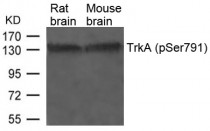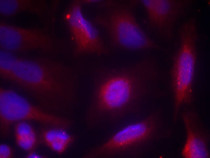ARG51798
anti-TrkA phospho (Ser791) antibody
anti-TrkA phospho (Ser791) antibody for ICC/IF,Western blot and Human,Mouse,Rat
Cancer antibody; Neuroscience antibody
Overview
| Product Description | Rabbit Polyclonal antibody recognizes TrkA phospho (Ser791) |
|---|---|
| Tested Reactivity | Hu, Ms, Rat |
| Tested Application | ICC/IF, WB |
| Host | Rabbit |
| Clonality | Polyclonal |
| Isotype | IgG |
| Target Name | TrkA |
| Antigen Species | Human |
| Immunogen | Peptide sequence around phosphorylation site of tyrosine791 (P-V-Y(p)-L-D) derived from Human TrkA. |
| Conjugation | Un-conjugated |
| Alternate Names | TRK; High affinity nerve growth factor receptor; Neurotrophic tyrosine kinase receptor type 1; TRKA; Tyrosine kinase receptor A; p140-TrkA; Trk-A; Tropomyosin-related kinase A; TRK1-transforming tyrosine kinase protein; TRK1; gp140trk; MTC; Tyrosine kinase receptor; EC 2.7.10.1 |
Application Instructions
| Application Suggestion |
|
||||||
|---|---|---|---|---|---|---|---|
| Application Note | * The dilutions indicate recommended starting dilutions and the optimal dilutions or concentrations should be determined by the scientist. |
Properties
| Form | Liquid |
|---|---|
| Purification | Antibodies were produced by immunizing rabbits with KLH-conjugated synthetic phosphopeptide. Antibodies were purified by affinity-chromatography using epitope-specific phosphopeptide. In addition, non-phospho specific antibodies were removed by chromatogramphy using non-phosphopeptide. |
| Buffer | PBS (without Mg2+ and Ca2+, pH 7.4), 150mM NaCl, 0.02% Sodium azide and 50% Glycerol. |
| Preservative | 0.02% Sodium azide |
| Stabilizer | 50% Glycerol |
| Concentration | 1 mg/ml |
| Storage Instruction | For continuous use, store undiluted antibody at 2-8°C for up to a week. For long-term storage, aliquot and store at -20°C. Storage in frost free freezers is not recommended. Avoid repeated freeze/thaw cycles. Suggest spin the vial prior to opening. The antibody solution should be gently mixed before use. |
| Note | For laboratory research only, not for drug, diagnostic or other use. |
Bioinformation
| Database Links | |
|---|---|
| Gene Symbol | NTRK1 |
| Gene Full Name | neurotrophic tyrosine kinase, receptor, type 1 |
| Background | Required for high-affinity binding to nerve growth factor (NGF), neurotrophin-3 and neurotrophin-4/5 but not brain-derived neurotrophic factor (BDNF). Known substrates for the Trk receptors are SHC1, PI 3-kinase, and PLC-gamma-1. Has a crucial role in the development and function of the nociceptive reception system as well as establishment of thermal regulation via sweating. Activates ERK1 by either SHC1- or PLC-gamma-1-dependent signaling pathway. |
| Function | Receptor tyrosine kinase involved in the development and the maturation of the central and peripheral nervous systems through regulation of proliferation, differentiation and survival of sympathetic and nervous neurons. High affinity receptor for NGF which is its primary ligand, it can also bind and be activated by NTF3/neurotrophin-3. However, NTF3 only supports axonal extension through NTRK1 but has no effect on neuron survival. Upon dimeric NGF ligand-binding, undergoes homodimerization, autophosphorylation and activation. Recruits, phosphorylates and/or activates several downstream effectors including SHC1, FRS2, SH2B1, SH2B2 and PLCG1 that regulate distinct overlapping signaling cascades driving cell survival and differentiation. Through SHC1 and FRS2 activates a GRB2-Ras-MAPK cascade that regulates cell differentiation and survival. Through PLCG1 controls NF-Kappa-B activation and the transcription of genes involved in cell survival. Through SHC1 and SH2B1 controls a Ras-PI3 kinase-AKT1 signaling cascade that is also regulating survival. In absence of ligand and activation, may promote cell death, making the survival of neurons dependent on trophic factors. Isoform TrkA-III is resistant to NGF, constitutively activates AKT1 and NF-kappa-B and is unable to activate the Ras-MAPK signaling cascade. Antagonizes the anti-proliferative NGF-NTRK1 signaling that promotes neuronal precursors differentiation. Isoform TrkA-III promotes angiogenesis and has oncogenic activity when overexpressed. [UniProt] |
| Research Area | Cancer antibody; Neuroscience antibody |
| Calculated MW | 87 kDa |
| PTM | Ligand-mediated autophosphorylation (PubMed:2927393, PubMed:1281417, PubMed:15488758, PubMed:7510697, PubMed:8155326, PubMed:8325889, PubMed:27676246). Interaction with SQSTM1 is phosphotyrosine-dependent. Autophosphorylation at Tyr-496 mediates interaction and phosphorylation of SHC1 (PubMed:15488758, PubMed:7510697, PubMed:8155326, PubMed:8325889). N-glycosylated (PubMed:2927393). Isoform TrkA-I and isoform TrkA-II are N-glycosylated. Ubiquitinated. Undergoes polyubiquitination upon activation; regulated by NGFR. Ubiquitination regulates the internalization of the receptor. |
Images (2) Click the Picture to Zoom In
-
ARG51798 anti-TrkA phospho (Ser791) antibody WB image
Western blot: Extracts from Rat and Mouse brain tissue stained with ARG51798 anti-TrkA phospho (Ser791) antibody.
-
ARG51798 anti-TrkA phospho (Ser791) antibody ICC/IF image
Immunofluorescence: methanol-fixed HeLa cells stained with ARG51798 anti-TrkA phospho (Ser791) antibody.







